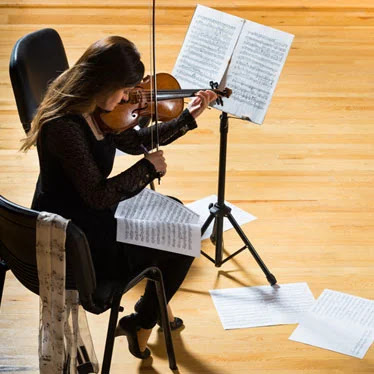Technology has opened a host of new professions and opportunities for people around the world. In fact, the music industry has been part of the growth – changing, expanding and evolving to meet new demands. Instead of competing for traditional jobs in an orchestra, among chamber musicians, or as soloists, emerging string musicians are looking at alternative careers that utilize their skills in new ways.
Undergraduate students have more opportunities than ever to enter a music career. With social media and global communications, the prospects are wide open. In fact, you can build your music career on your own terms. However, there are certain steps you need to take to ensure that you reach the goals you have in mind.
1. Build your entrepreneurial mindset
To forge a new path, you have to be willing to take risks. That’s what entrepreneurs do. They take an idea and develop strategies that will allow them to make it a reality. The most successful use determination and drive to make their vision materialize. This means that you’ll need to learn to write a business plan. There are many free resources available online if you search ‘music business plan.’ Remember, you’ll need to do your homework on this. The greatest idea will fail without the right planning.
2. Understand exactly what you want to do
This is sometimes easier said than done. Perhaps you know you want to have a professional music career, but the exact nature of the idea is rather hazy. While writing your business plan, you’ll discover that you’ll need to outline your specific goal. To understand that point, you'll need to be able to articulate your specific intent. Having a few, explicit sentences ready when people ask you about your plan will also keep you on the path of success. Your intent should outline your immediate and future goals.
3. Build a network of contacts that support your idea
In the music industry, much like other industries, who you know can make all the difference between success and failure. For your career, cultivate relationships with new and old colleagues. People who can help you gather ideas and new perspectives for your career projects. It’s also a good idea to build an advisory board of your closest contacts to help counsel your decisions. Effective entrepreneurs understand that they can’t do it alone. They need alternate insights and other's specialties to succeed.
4. Build your selling skills
This doesn’t mean take a course in used car salesmanship. It means that you need to build your charisma. Can you easily describe your vision so that it inspires others? That’s what you need to cultivate. Your performance ability is just as important as your verbal and written skills. Cover letters, grant proposals and other solicitations require strong communication to be effective. If you can articulate your dream so that it compels others, you’ll be able to achieve your goals faster.
5. Plan your work, work your plan
This adage applies to every activity. In order to realize your short and long term goals, you must plan and then do. Break down the steps you need to accomplish to achieve a specific objective. This means having daily “to-do” lists that work toward the end result. Each objective should be part of the steps required to complete another stage in your plan. Although this is part of your initial business plan, writing down a series of tasks to fulfill each day helps keep you motivated and on track.
6. Utilize the Internet in every way
Successful promotions no longer require huge amounts of money to ensure they work. The Internet has leveled the playing field for a number of business enterprises, including the music industry. You can build a following for your music on social media, websites, and YouTube. If you aren’t really computer savvy, there are self-help books available by the millions. Do a little research before launching your online marketing campaign. You can also employ experts to fulfill that part of the process, but remember, the Internet is essential for building a music career.
7. Employ sound budgeting and outreach strategies
No business can operate without a clear budget. By understanding your income and expenses, you’ll be able to make smart decisions about the next steps in your plan. Also, consider employing an agent, if you don’t already have one. An agent will work from commission, so you can earn funds and keep your performance skills sharp while you’re building your music career.
Establishing a music career has never been easier, but that doesn’t mean the journey won’t be hard. Remember to keep your love of music alive and motivate yourself during the process. It’s rare that entrepreneurs become successful overnight. If you maintain your strategies, you can successfully realize your dreams.
Published by StringOvation Team on July 25, 2017

